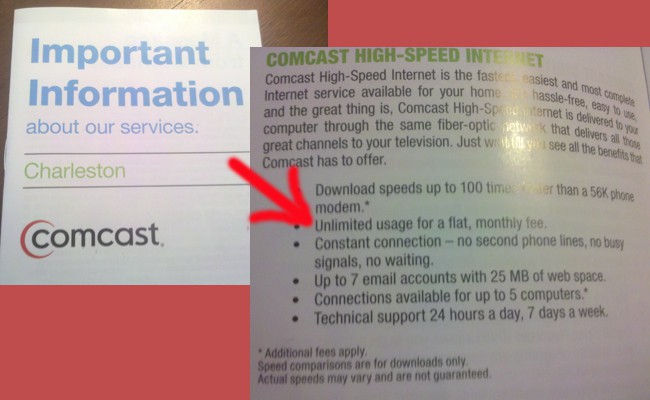 Broadband providers love to tout their Internet services as “unlimited, always on access at blazing fast speeds.” Increasingly, their service isn’t unlimited, it’s not always working, and those blazing fast speeds are doused in a shower of asterisks leading to fine print indicating “speeds are not guaranteed.”
Broadband providers love to tout their Internet services as “unlimited, always on access at blazing fast speeds.” Increasingly, their service isn’t unlimited, it’s not always working, and those blazing fast speeds are doused in a shower of asterisks leading to fine print indicating “speeds are not guaranteed.”
Take Comcast, for example.
The Consumerist‘s reader Matt received a brochure from America’s largest cable operator filled with inaccuracies, falsehoods, and fine print. In order of appearance, let’s fact check:
Fiber Fiction: “Comcast High Speed Internet is delivered to your computer through the same fiber-optic network that delivers all those great channels to your television.”
Fiber Fact: Comcast does not operate an all-fiber network. Their distribution system uses a mix of fiber and standard copper coaxial cable. The fiber network is only a backbone, which connects to the same coaxial cable companies like Comcast have used since the 1970s. If you want a true fiber-optic network, you’ll need to sign up with Verizon FiOS or a municipally-run fiber provider. No national cable operator runs one. It’s part of their marketing rhetoric to try and capitalize on the benefits of fiber without actually spending the money to actually build a fiber system.
Speed Trap: “Download speeds up to 100 times faster than a 56K phone modem.”
Autobahn: This one has one of those asterisks attached — “actual speeds may vary.” Comcast doesn’t guarantee speed, and relies on the familiar “up to” disclaimer that phone companies love to use with their DSL service. If your neighborhood is clogged with users, the websites you visit run slowly, or Comcast has a problem somewhere, your speed will suffer.
Unlimited That Isn’t: “Unlimited usage for a flat, monthly fee.”
Unlimited Reality: Comcast has a usage limit of 250 GB per month. Exceed it and you potentially will get a call from Comcast lecturing you about your usage. Ignore them and you may be without your broadband service for a year.
Consumerist reader Matt was a victim of Comcast’s marketing doublespeak when he exceeded the limit and got a phone call from the company. Instead of being browbeaten by Comcast customer service, he was ready and armed with the brochure the company sent him:
I was told I used more data than they allow (250GB). I do not argue that I used over 250GB, in fact I went quite a bit over. Though I did want to ask for proof that affected their network, I figured it wasn’t the nicest way to start the interaction. I informed them that I used this because it was sold as “Unlimited usage for a flat, monthly rate.” He then told me it said “access.”
I had the brochure right next to me and quoted, “Unlimited usage for a flat, monthly rate.” He told me their website says something different, and my local franchise overstepped its bounds, and their website overrules the “Important Information about our services, Charleston SC” sales brochure sent to me. If I went over again (It goes by calender month, not billing cycle) I would be disconnected for 1 year without giving me a call.
I asked if Comcast had a tool to help me monitor bandwidth. “Not in your market” he told me. “Download something from Google that will do it for you.”
As consumers continue to expand their broadband usage to take advantage of services like online video and file backup, services Comcast itself offers, more and more will run up against Comcast’s monthly usage limit. Although your Comcast bill increases year after year, their usage limit has not. It was 250 GB in 2008 and remains the same in 2010. Thanks to Stop the Cap! readers Dave and Michael who sent word our way.


 Subscribe
Subscribe





